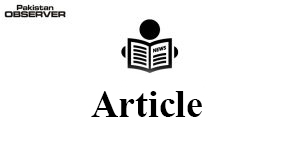Prof Abdul Shakoor Shah
AFTER 1947, Pak-Turkey relations were limited to religion and culture. The 1950s security policies proved vital for bilateral relations. Both aligned with the West against Russian threat. The Baghdad Pact brought them closer and both pursued western security policy in the early 1960s. After the mid1960s, both developed independent bilateral relations within the framework of the RCD. Pakistan semi-aligned with China after 1965. Turkey also stepped back from the US after Cyprus policies. In the 70s, both were involved in military operations. Pakistan lost its eastern wing while Turkey intervened militarily in Cyprus. Pakistan fully supported the Turkish stance on Cyprus which proved highly positive in developing national security ties.
During the 80s both realigned with the West. Russian invasion of Afghanistan and Iranian revolution greatly affected it and endangered the western interests in the region. Both were passing through and facing almost the same circumstances of coups, threat of communism and Iranian ideology. The military high ups of Pak-Turkey were aspirants of western alliance. 1990s stagnated due to the Cold War, Balkans and the Central Asian Republics for Turkey while Pakistan focused on Afghanistan. After 9/11 Pak-Turkey worked together in Afghanistan. Pak-Turkey contributed to Afghan peace process. Until Erdogan govt. Pak-Turkey relationship had been largely ceremonial.
Pak-Turkey have multifarious strategic locations in an intricate security region. Both have undergone the havoc of the Cold War and Post Cold War chaos. Pak-Turkey had centuries’ long relationship mostly limited to speechifying. In the past, little practical was done to benefit from this relationship. Bilateral trade falls below $1 billion, but optimistically, in recent years, it soared up to 40%. The Turkish imposition of safeguard duties on Pakistani textiles has declined Pakistani exports. On the other hand, India-Turkey trade mounts to over $5 billion. The political stability in Turkey in the last decade has boomed its economy. Public to public relations are weaker due to Western channels of information which project less positive aspects that is a challenge for Pak-Turkey ties. There is no academic, cultural and research institution in either country to strengthen bilateral relationship. Pak-Turkey must step ahead to eradicate the existing hurdles in every field of mutual cooperation. Turkey, with its booming economy and being a G-20 member can consider relocating Pakistani exports.
Pakistan can easily lure Turkish construction industry in the country for low-cost housing units. Pak-Turkey may get ahead smoothly in agro-based industries. Pakistan, being the 4th largest milk producer, still imports cheese from the EU. We can re-align our agro-based industry with Turkey to enable our agro-based products for export. Both the countries are already cooperating in the educational sector, though mostly relying on scholarships; they must jump up to research work and educational infrastructure. Pak-Turkey have greater prospects of cooperation in every field for their mutual benefits from education to media and defence to construction and the list goes on. Pak-Turkey can improve their defence by exchanging their expertise in the field of space technology. Turkey has been pitching the ATAK T129 helicopter on all occasions both the countries can join in manufacturing and redesigning their air jets. Turkey can benefit from Pakistani innovation of JF-17.
Turkey’s high wires are following the policy of balance between the East and the West focusing Europe and the US on one hand and Russia and China on the other. Turkey is minutely observing the changing economic and strategic circumstances in the East and in the west. USSR’ military and economic goals and China’s Belt and Road/CPEC are very important for Turkey. Turkey has supported Pakistan on the Kashmir issue which is proof that Turkey seriously considers Pakistan as Asian giant instead of India. Turkey has also backed Pakistan in the Nuclear Suppliers Group.
Turkey considers that Pak-Turkey strategic and military ties will usher a new era of influence for Turkey in Asia. Ankara seems to be realizing that EU’s dealing with Brexit and an aggressive Russia and ignoring Turkish claims. Pakistan considers itself a major player in Afghan peace process, mediator with Iran and a strategic partner supporting Turkey for balancing the East and the West. The West has concerns of refugee flows from Turkish borders. Pak-Turkey relations are prioritized in the field of security, defence, terrorism and trade. Pak-Turkey relations can prove very vital for the West in solving certain issues. The US is looking into two dimensions. The US is looking at Turkey from the Syrian and Russian lens and Pakistan from India, Afghanistan and Chinese lens. Turkish Sunni inclination has pushed Turkey further away from Saudi Arabia and Iran.
During the 2016 Turkish coup Pakistan supported Erdogan which strengthened bilateral relations further. Pak-Turkey bilateral trade is mounting up slowly but steadily and it is expected to cross $900 million to $10 billion in 2022. Pak-Turkey are also collaborating in the aviation sector. There is a recent tourism agreement between the two countries which will strengthen their economy. Mustafa Kamal was called ideal by General Musharraf and the later developments show that Pakistan may follow the Turkish model. On international front both the countries have been supporting each other in regards with Azerbaijan and Armenia in return Turkey supported the Kashmir cause. Mr. Khan and Erdogan share the decision making tables.
—The writer is Prof in English, based in Lahore.










